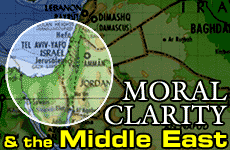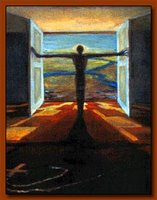 Lately, I've wondered if our country, even our entire species, is adrift. As we fight a war of theoretical "good vs. evil" in Iraq, we find ourselves in a mire of uncertain values and questionable tradition. Although our leaders assure us of the inviolability of our fight, we as a nation relentlessly question our own priorities and motivations, as we should. In the next couple of posts, I will explore the concepts of good and evil and in doing so I will attempt to find some tools that can help us discover some meaning in a world inundated by conflicting ideas of right and wrong.
Lately, I've wondered if our country, even our entire species, is adrift. As we fight a war of theoretical "good vs. evil" in Iraq, we find ourselves in a mire of uncertain values and questionable tradition. Although our leaders assure us of the inviolability of our fight, we as a nation relentlessly question our own priorities and motivations, as we should. In the next couple of posts, I will explore the concepts of good and evil and in doing so I will attempt to find some tools that can help us discover some meaning in a world inundated by conflicting ideas of right and wrong.As science and technology have pushed back the veil of ignorance, our concepts of "sacred" "good" and "truth" are constantly challenged. It is easy to wonder if our daily efforts, as individuals or as a nation, are attached to any meaningful goal. Am I, are you, are "we" moving in the right direction, and what does that mean anyway? Do we live in a universe of absolute good & evil that we choose to ignore at our peril? Or are good and evil oversimplified, man-made concepts for which we waste our time & energy? Is there an adequate measure to inform our choices and decisions? This elusive yard stick has been sought ever since humanity discerned that it could discern. We call this concept Morality.
 Morality can be defined as an ethical motive, or a motivation based on ideas of right and wrong. But really, this definition just confuses the issue even more. Who's idea of right or wrong? Is morality an individual choice, or is it a universal constant that we as individuals choose to adhere to in a greater or lesser extent than those around us? From what source do our ideas of right or wrong derive?
Morality can be defined as an ethical motive, or a motivation based on ideas of right and wrong. But really, this definition just confuses the issue even more. Who's idea of right or wrong? Is morality an individual choice, or is it a universal constant that we as individuals choose to adhere to in a greater or lesser extent than those around us? From what source do our ideas of right or wrong derive?The traditional answer has been of course religion. The idea that a deity hands down cosmic edicts to his creation by which we must rule ourselves is common to nearly every culture throughout the history of mankind. Although this view is still held by many, as is their right, my discussion, which will span at least a few posts, regards the moral direction of our nation & world within the sphere of foreign policy. Therefore, as America is not a Theocracy, this religious "yard stick" is, by definition, a poor tool to employ when determining our nations moral focus. Additionally, the use of religious dogma as a moral compass was anathema to the founders of our nation. I'll touch on this more in a later post.
What about "Common Sense"? Can we trust our instincts, our conscience, our innate sense of right and wrong to lead us in the right direction? For centuries, entire cultures have killed each other in wars fought by intelligent people, and in which each side was thoroughly convinced of their moral authority. In our country today, we cannot come to a consensus regarding the comparative values of a human fetus or a spotted owl. So tell me, how common is common sense. I have to believe that there is a better guide for moral judgment.
Biological necessity is another "system" that has been employed when determining right from wrong. Consider the idea that our universe rewards "right" choices and punishes "wrong". Although this is peripherally related to the concept of evolution, evolution is not what I refer to here. Rather, I am talking about the simple idea of cause and effect on a historic scale. If culture X develops, over time, the moral concept that random murder is a noble action, they would not survive; instead, they would simply kill each other off. If culture Y declares that incest is "sinful", and culture Z does not, then Y has a better chance of producing genetically viable offspring, and therefore of survival. It is interesting to look at the many sins defined by the the various religions of the world, and to then determine the biological basis for each.
 So what is the ultimate foundation for our morality? Is it a constant or is it a cultural variable? Do absolute good and evil even exist in any meaningful way? Unfortunately there is no clear demonstrable answer. However, if we analyze the many available methods of determining right from wrong, from faith to logic, or even that small voice in our heads called conscience, we may reasonably conclude that the principals good and evil are similar to if not synonymous with the eternal concepts of order and chaos. "Good" things make our lives & societies more orderly and allow us to thrive. "Evil" things breed disorder and make our lives & societies more difficult to manage. Perhaps we understand this on a primal level. Perhaps we can use this "yard stick" of order vs. chaos to find some answers.
So what is the ultimate foundation for our morality? Is it a constant or is it a cultural variable? Do absolute good and evil even exist in any meaningful way? Unfortunately there is no clear demonstrable answer. However, if we analyze the many available methods of determining right from wrong, from faith to logic, or even that small voice in our heads called conscience, we may reasonably conclude that the principals good and evil are similar to if not synonymous with the eternal concepts of order and chaos. "Good" things make our lives & societies more orderly and allow us to thrive. "Evil" things breed disorder and make our lives & societies more difficult to manage. Perhaps we understand this on a primal level. Perhaps we can use this "yard stick" of order vs. chaos to find some answers.To be continued ...
Related Posts: The Values Devide - Authoritarianism, Morality Is Subjective -Origins


No comments:
Post a Comment